I didn’t expect any less after yesterday, but it’s been an amazing second day at Women in Language. There’s so many things I want to do now – though I’m not sure what I want to do with them, precisely, or how – and I figured I’d share what I’ve taken away from the talks I attended today!
The Whys and Hows of Language Learning Apps
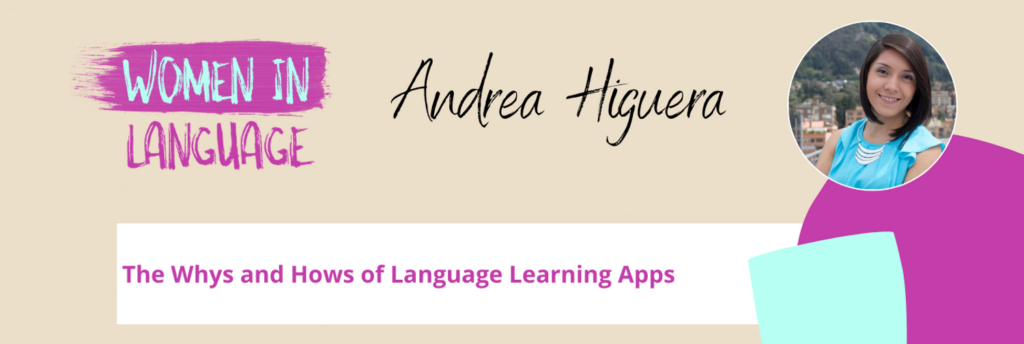
This talk, from Andrea Higuera, the founder of the Yask app, was especially interesting to me as I work in marketing for another language learning app! That meant that some of this was familiar to me (I’m gonna start dreaming about sales funnels, I swear), but coming at it from a language learner’s perspective was still incredibly useful.
This was especially true when Andrea explained the octalysis framework and how we can ‘hack’ our language learning to hit different parts of this framework and keep ourselves learning in a way that’s fun and effective. For example, one part of the framework is ‘development and acquisition’ – we, as humans, like to see our progress as we acquire new skills. Within an app, we can see this when we complete units, or get points, or level up… Outside an app, a good way to do this yourself is to track your progress in a way that works for you.
Obviously, I loved hearing that, since I’ve been working on my mega language learning progress spreadsheet this year. (After getting fully into my tracking habit last year!)
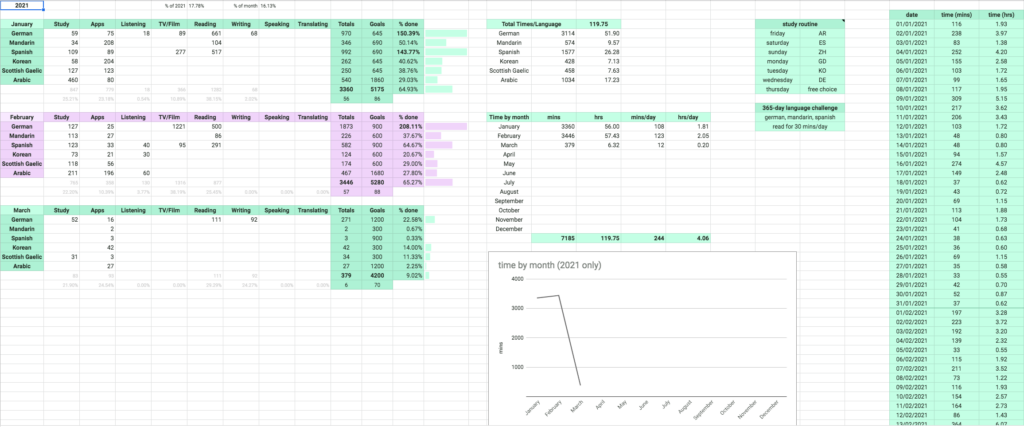
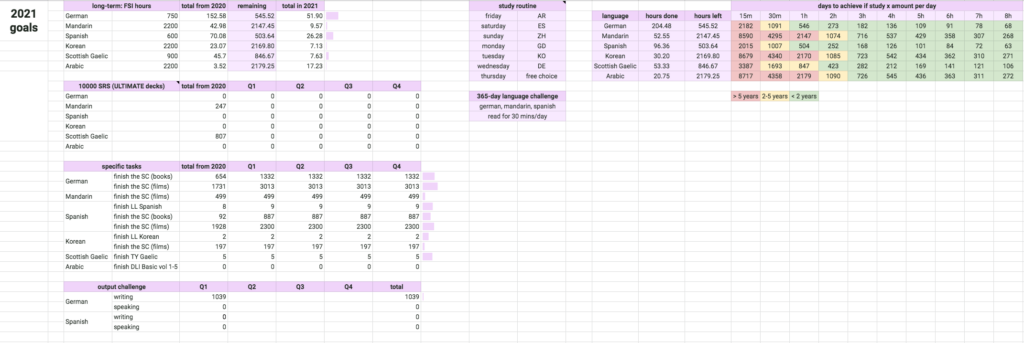
There were also other great tips, like: rewarding yourself for achieving specific goals; start doing the tasks you’ve always wanted to do or have seen other people do; track your streak, etc.
A couple of things she suggested might be helpful for other people but won’t necessarily work for me – when it comes to resources, she suggested that to fulfil the framework point of ‘ownership and possession’, you shouldn’t move onto the next resource until you’ve completed the one you’re on. I don’t think for a second that that’s bad advice; I just am working on a multi-track approach right now, so I’m kind of jumping between things.
Plus, Andrea doesn’t seem to like Anki, which is such a shame because I think, in terms of SRS apps, it’s the best one. It allows for so much customisation – both of itself and of the cards you put in it; and besides, I find there’s little use to using pre-made decks because you learn too much out of context. However, if you don’t like something, don’t use it! There’s plenty of people who don’t use SRS at all and learn really well; I just wouldn’t want people to dismiss Anki out of hand because it looks a bit naff or too complicated.
The main point I took from Andrea’s talk, anyway, was one she said near the end: if a habit is becoming a chore, make sure that what you’re getting out of it is equal to the energy you’re putting in. And this? It’s something I 100% agree with. Don’t try and power through things you hate – find something you like. Make sure your habits are adding something to your learning (or whatever else they’re there for) and you’ll probably find they’re much easier to stick to.
You can find Andrea on Twitter here, or go ahead and check out the Yask app, where you can get your writing corrected by native speakers. If you’re at the Women in Language conference this weekend and you’ve joined the Facebook group, there’s a link on there somewhere for one month of pro membership for free!
A Woman’s Guide to the Latin Language
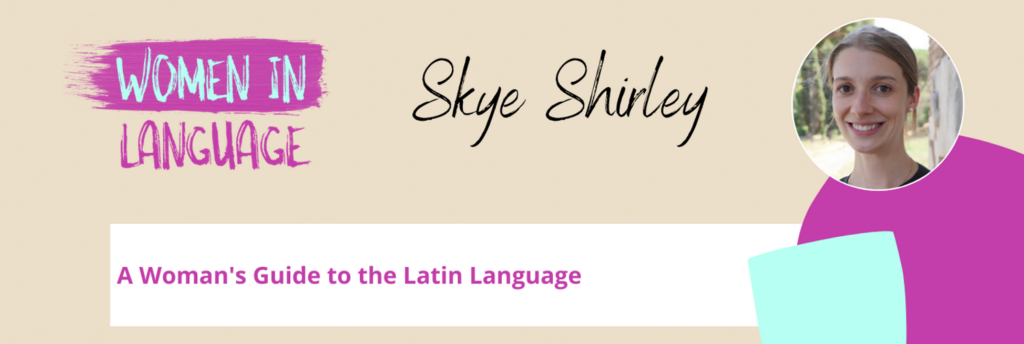
So, I’ve never been interested in learning Latin. I’ve definitely checked out resources for it before – because there are so many available for free online – but it’s not something that’s seemed useful for me; I know that I enjoy learning about history, sure, but I’d rather read about a specific topic that’s already been curated by someone rather than dig through that myself. That means, of course, that Latin’s never seemed useful for me.
Honestly, the only language I’d kind of associate with Latin that I’d been interested in learning before was Old English (and maybe Middle English, since we did a teeny bit of Chaucer in school), but that was more idle curiosity than anything.
But then I listened to Skye Shirley’s talk on Latin and, oops, I might have found a new language to fall in love with.
Well, actually, to try and avoid because I’m still learning like five languages and who has the time, but she really made Latin sound cool!
As you can tell from the title of her talk, Skye wasn’t there to teach us Latin – instead, she gave us an overview of some of the challenges she and others have faced as women (or non-male individuals) who are trying to learn and speak this language. There are still so many male-only spaces in the Latin learning community and she and others have carved out a space where they can explore not only what it means to be a woman speaking Latin, but can continue the scholarship of women who existed and spoke and wrote Latin and who have been forgotten or ignored or lain by the wayside today.
She gave us some tips on how not to learn Latin – i.e. tips about how to find ways to learn Latin that we would enjoy, including a buddy system to navigate through some of the murkier remainders of the language. (Spoiler alert: Witch hunts were not a Fun Time, not for anyone.) We also learnt about some more intricacies of ‘Women’s Latin’ – the fact that women often took – and still take, now – Latin names, both to account for the complexities of declination, as well as to allow for another expression of personality.
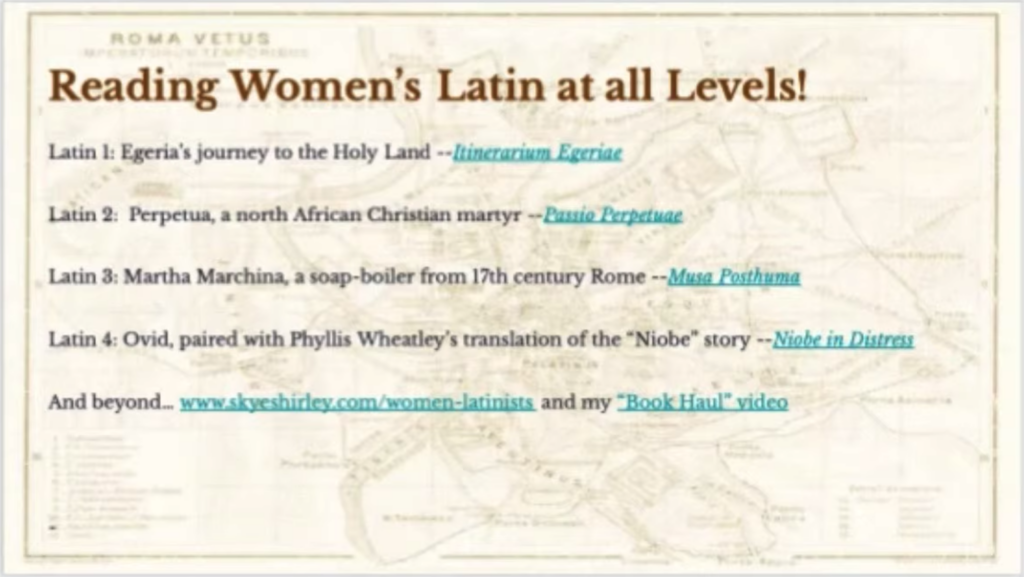
The interesting question Skye raised here was one that pops up in pretty much every language, but is even more thorny for a language like Latin, where the canon has been carried by men and holds so much historical context: do we shape language, or does language shape us?
I think this is a question we all have to work on in every language we speak; it makes me think of English, and the changes I’ve noticed in, for example, a prevalence in LGBTQ+ friendly terms in the last ten years or so. Those terms have arisen as people have developed the vocabulary to describe their own experiences – so then does having a word for something actually change the opinions of people outside that initial group?
I like to think it can. Being able to articulate something that you know about yourself makes you more comfortable and more validated; it lets you know that you belong with the other people who know that term. And it equips you – and others – with the tools to clearly explain this to people who have no idea about it. We know, of course, that this doesn’t stop all the prejudice, but I think it helps normalise notions that otherwise would have been, at best, dismissed, and at worst, persecuted.
But I’m going off on a tangent.
Skye told us, too, about her Latin reading group – Lupercal – as well as a host of other resources that can help you to learn and improve your Latin through that women-friendly lens.
Here’s a few:
- The ‘Women Latinists’ Soundcloud
- ‘In Foro Romano’ podcast
- Latin and Lattes
- Irene Regini’s ‘Satura Lanx’ projects (YouTube)
- On Instagram – @diatithemene’s Latin bullet journals (!!!)
- Videos to help you write your first Latin novella – ‘Bene narras’
You can find Skye on Twitter here, or go visit her website to find out more about her and the work she’s doing.
From Alphabets to Abugidas: How to Learn a New Script
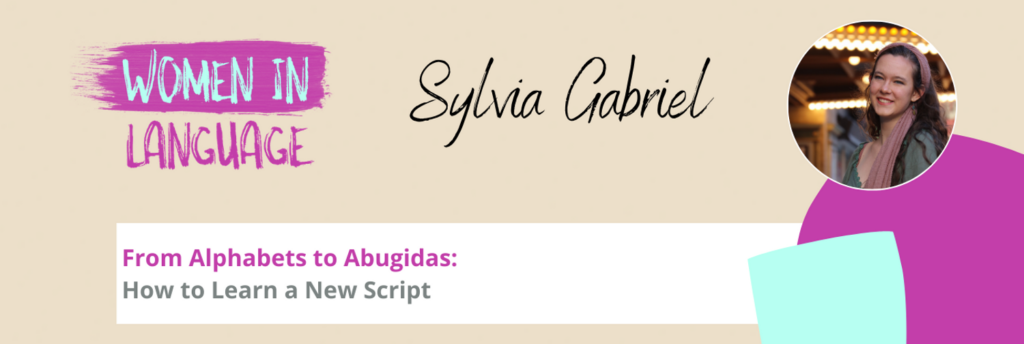
Before this talk, I don’t think I’d seen the word ‘abugida’ before. Abjad, yes, though I wasn’t sure what it meant. Not to worry, though, because Sylvia Gabriel took us through all sorts of different writing systems and gave us some great tips on trying to learn them.
She pointed out that, if you’re worried about learning a language with a different script because it has a different script, then you really don’t have to. Learning a new script really doesn’t take too much time (let’s just ignore hanzi/hanja/kanji for now!), especially when compared to the total amount of time it’s going to take you to learn that language.
She had some great tips for learning a new script too – when this weekend’s over and I finally get to sit down with Arabic again, I’m going to take a crack at some of them:
- learn a few letters at a time (stellar advice; I even did this in Anki, suspending all the letters, then reactivating a few at a time as I went through my workbook)
- review old letters
- learn letters in context
- read native words
- create your own words
- practise both writing and reading (I put this off in Arabic again, but I just sort of muddle through the letters I don’t know yet!)
- distinguish similar letters (I would suggest: learn them entirely separately; then you’ll know one really well and it should be easier to distinguish this one from the new one)
- understand how the script works
- keep it interesting
- keep learning the language
So, yes, I love this advice! She talked us through the difference between alphabets, abjads, and abugidas as well, using examples from the languages she’s learnt – which it was especially awesome to see she’s learnt Bengali and at least the Kannada script!
Sylvia also gave us advice for manual alphabets – so those alphabets used for sign languages. After my stint with sign languages last year, I still remember the BSL alphabet (but I kind of knew that anyway), but I’ve forgotten ASL, sadly. Still, here’s Sylvia’s tips:
- watch videos (so you know the correct finger placement – and my obligatory warning for BSL is that you use both hands, so make sure you’re using your dominant hand correctly!)
- practise spelling words whenever you can – just do it throughout your day; spell what you see
- practise with a friend or BSL speaker so that you don’t just practise production; you need to be able to understand, too!
If you’re looking at learning a new language with a different script, then I recommend checking out Sylvia’s talk if you can – or just take a look at what she’s doing on Instagram. It’s good stuff!
Growing your Language Business (or not) – On Mindset and Self-Worth
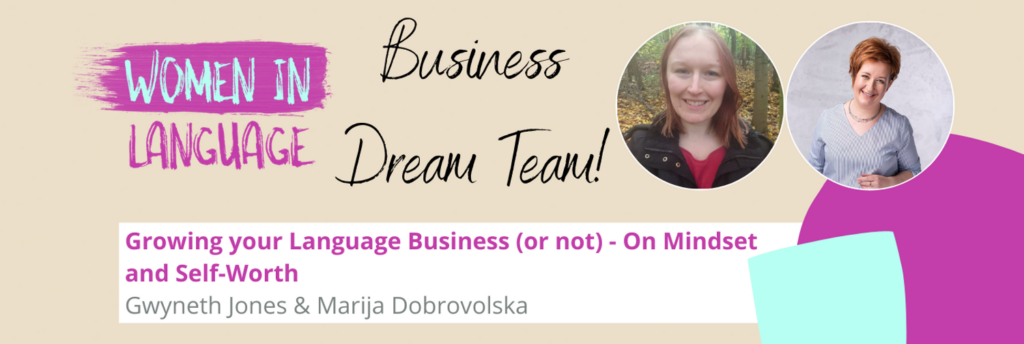
I didn’t take a ton of notes for this talk, but that has no relation to its value! Gwyneth and Marija, both online teachers, of Welsh and German respectively, talked us through how they built their online teaching businesses and their advice on how to build and grow your own.
Although both women are language teachers, what was great here was that they gave us advice that could be applied to just about any venture – including projects that you don’t want to make money from at all. And, helpfully, they were coming from a place that addressed a lot of problems women in particular seem to face: confidence when it comes to promoting ourselves and our ideas, fighting off imposter syndrome, and the idea that something has to be perfect before we begin.
Naturally, some women have to deal with these issues more than others, but it was great to have them all laid out and to have two successful people give advice on how to overcome them.
One thing that Gwyneth said stuck with me – she said that she started her YouTube channel, kind of abandoned it, and when she went back, found that people had been watching her videos and then started making more of them. She said that having no attachment to the outcome of those videos made the whole journey a lot easier, and that if you’re starting a side hustle, it’s better to just build that up slowly and naturally and make the switch (if you want to), when you’re able, instead of trying to rush into things.
Marija’s advice was also great and repeated what I think could be a background slogan for the Women in Language conference: just start. Just start that YouTube channel, start that podcast, start that blog. It doesn’t matter if it’s all terrible (and it probably will be – practice makes perfect, after all) because you can’t improve if you stand still, right?
They also discussed how to charge what you’re worth – always an important topic for freelancers or people who are self-employed – and a little about self-care in self-employment, which seemed particularly relevant as many of us are still working from home; we might not be self-employed but those work/life boundaries can be quite easy to trip right over.
Check out Gwyneth’s YouTube channel here (you can find a link for her newsletter on there), and Marija’s Deutsch mit Marija channel is here – handily, she specialises in B1-C1 level (so I’m gonna be there a lot)!
Books in Translation: 30 Books to Enjoy Along your Language Journey
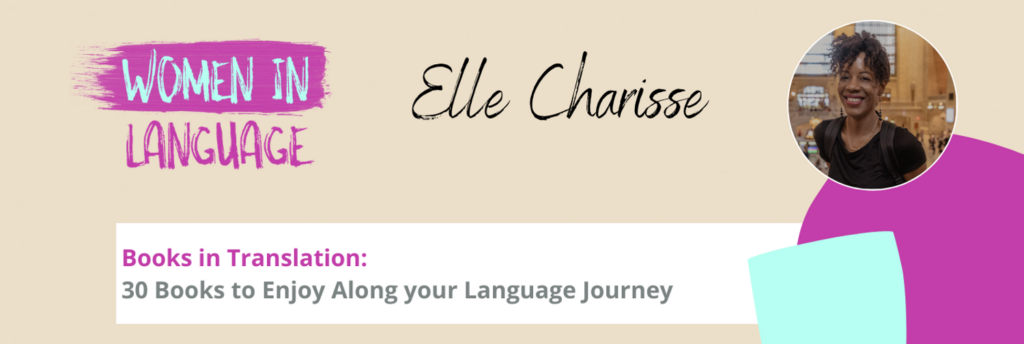
This was more-or-less the last talk I watched today (I had the next talk on in the background as I tried to catch up on some work, but by then I’d been sitting still for like five straight hours and I was hungry), and it was such a relaxing time in the middle of this conference.
Elle Charisse, host of the Speaking Tongues podcast, took us through 30 (of the, presumably, hundreds??? of) books she read last year, all translated from other languages into English. She gave us her impressions of the books and what was really great was that, even when she covered large ‘mainstream’ languages, like Portuguese and French, the books she chose explore parts of the world and cultures that most people learning those languages traditionally might not have much contact with.
I made a list of the ones I was most drawn to (and I’ve added them to my Goodreads TBR):
- Convenience Store Woman by Sayaka Murata (tr. Ginny Tapley Takemori)
- Flowers of Mold by Ha Seong-Nan (tr. Janet Hong); Elle said this reminded her in some ways of Parasite so I was, obviously, immediately sold
- Frontier by Can Xue (tr. Karen Gernant and Chen Zeping)
- Thirteen Months of Sunrise by Rania Mamoun (tr. Elizabeth Jaquette)
- Frankenstein in Baghdad by Ahmed Saadawi (tr. Jonathan Wright)
- Celestial Bodies by Jokha Alharthi (tr. Marilyn Booth)
- That Hair – Djaimilia Pereira de Almeida (tr. Eric M. B. Becker)
- The Stationery Shop by Marjan Kamali
- La Bastarda by Trifonia Melibea Obono (tr. Lawrence Schimel)
- Ten Women by Marcela Serrano (tr. Beth Fowler)
- Bride and Groom by Alisa Ganieva (tr. Carol Apollonio)
I’m excited to get into these – I’ll check out my library (online right now) but lots of them are fairly cheap on Amazon, especially since I read more or less everything on Kindle nowadays.
Elle’s recommendations also had me thinking about books I want to read (in general) and genres I’d like to explore (in my TLs) and the fact that I do love translation, really, and should get back into researching stuff more. There’s a dearth of research into some genres (my MA was Audiovisual Translation and Popular Culture, a.k.a. TV/film and genre fiction, haha!) that I really enjoy reading, and so I’m thinking after this conference is over, I might start looking into that and seeing what I find.
A cool thing, though: Elle’s also setting up her own book club, so if you’re interested in that, go to her website and scroll all the way down to join her newsletter. Apparently, we’ll hear the details this month, and I can’t wait! Plus, make sure to check out her podcast – which I didn’t realise she started last year! It’s really cool, you’ll love it.
To sum up…
Phew, so that’s pretty much the end of my second day! Like I said, I did run the talk “Conversation as a Dance”: Listening and Giving Space to Speak in Language Learning (and Beyond) in the background as I tried to finish some stuff for work, but that was quite a complex one that really required my full attention.
Ironically, I should have known to listen from the title, huh?
But anyway, I’m hoping to catch up on that and the social media discussion tomorrow – there are a couple of talks I’m less interested in watching live, so I’ll see what I can fit in.
Also, I need to fit in some language learning somewhere! All this talk and no action. Though, I’m sure this weekend will have me raring to go come Monday.
I hope you’ve all had a great Friday – and have a fun weekend, whether you’re at the conference or not!
